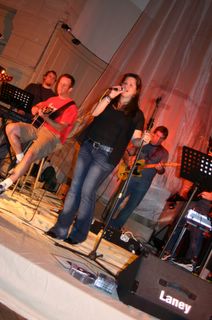
This is a shot of our concert at the Reformed Church of Bellville in Paris.

Where are you going?
Luke 5: 4-5a
"When He had finished speaking, He said to Simon, "Put out into the deep water and let down your nets for a catch."
Simon answered and said, "Master, we worked hard all night and caught nothing, ..."
I wonder what Peter was thinking when Jesus asked him to put down the nets on the other side. Peter fished for a living. He was an expert, he'd done it a thousand times and he didn't need some preacher telling him how to do his job.
My harsh assumptions on Peter's motives really only come from what I see when I look inside myself and imagine myself in the same situation. I would probably try to explain to Jesus that I had already tried that once, or show him my chart of fish migration patterns during this season or come up with some other complicated web of logical reasoning to not get my nets all wet and dirty again (I hear it’s a lot of work to clean those things.) Of course, I would have been completely wrong and would have missed out on the incredible blessing of not only a whole grip of fish, but the opportunity to see God do something that’s amazing and beyond my expectation.
Jesus is pretty much and expert at everything. As skilled as I am I will never be better at it than Jesus. The whole deity thing definitely gives him an edge. Sometime I forget that, though. Sometimes I don't want to admit it. Why is it that I would take pride in being able to accomplish something without God's help? Is that some kind of badge that I would wear proudly into the throne room. "Look Father, I did all of this and I didn't even need you!”
Fortunate for Peter he’s a lot smarter than me. He throws up an initial logical reason for not putting the nets down on the other side, but seems to quickly concede to Jesus’ wishes.
Luke 5:5b-11
"...but I will do as You say and let down the nets." When they had done this, they enclosed a great quantity of fish, and their nets began to break; so they signaled to their partners in the other boat for them to come and help them. And they came and filled both of the boats, so that they began to sink. But when Simon Peter saw that, he fell down at Jesus' feet, saying, "Go away from me Lord, for I am a sinful man!" For amazement had seized him and all his companions because of the catch of fish which they had taken; and so also were James and John, sons of Zebedee, who were partners with Simon.
And Jesus said to Simon, "Do not fear, from now on you will be catching men." When they had brought their boats to land, they left everything and followed Him.
An amazing thing happens when you’re obedient to Jesus. First, you find out that He actually knows what He’s talking about. And second, your daily routine becomes a transformational experience. Simon was literally floored when he saw all of the fish. Not because he’s never seen this many fish before, but because he got to experience a little of Jesus’ power. He was terrified when he realized the truth about who was standing before him, but Jesus did something even more amazing. He turned these fishermen into fishers of men. Jesus had a purpose for them and it had nothing to do with their skills. Jesus wasn’t lacking any talents of abilities so much that he needed to gather this dream team of talented professionals to complete his mission. This group of disciples was chosen based on the receptiveness of their hearts. They were willing to be obedient when it didn’t make sense, amazed when they saw the result, and abandon everything for his sake when he called them to something bigger.